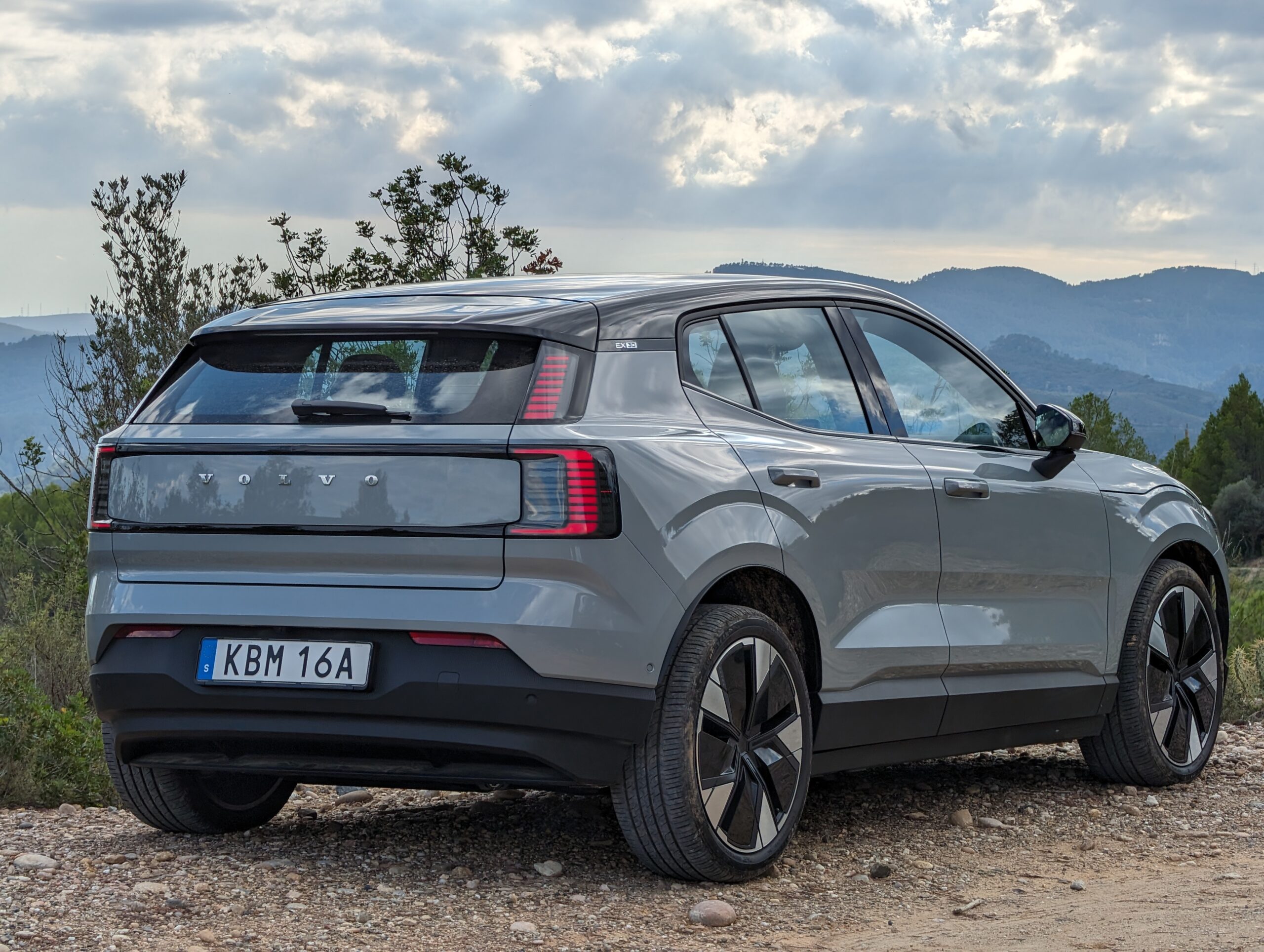Sign up for daily news updates from CleanTechnica on email. Or follow us on Google News!
The Volvo EX30 battery-electric midsize SUV goes on sale in the US this summer. While the company made it a point to emphasize how small the EX30 is when it introduced the car last year, in truth, it is a little smaller than a Tesla Model Y, but not that much. The EX30 has considerably less luggage space behind the rear seats than the Tesla, but otherwise it is quite capable of transporting four or five passengers from point to point with the level of comfort people expect from Volvo. The base model has a range of 275 miles and can sprint to 60 mph in about 5 seconds.
 Those numbers are for the entry level EX30 with a single rear motor. By comparison, the Tesla Model Y RWD lists for $42,990 (today — who knows what it will be tomorrow?), has a range of 260 miles and needs 6.6 seconds to get to 60 mph. The dual motor EX30 costs about $10,000 more but is still a few thousand dollars less than the comparable Model Y.
Those numbers are for the entry level EX30 with a single rear motor. By comparison, the Tesla Model Y RWD lists for $42,990 (today — who knows what it will be tomorrow?), has a range of 260 miles and needs 6.6 seconds to get to 60 mph. The dual motor EX30 costs about $10,000 more but is still a few thousand dollars less than the comparable Model Y.
The Volvo has been an instant hit in Europe and should be well received in the US as well. Lance Morgan, sales manager at Volvo Cars Carlsbad in California, told Reuters recently his dealership has already taken deposits for every 2025 EX30 the dealership can get. “I think this could be quite the game-changer for the whole brand,” he said. Despite its aggressive price, Volvo is targeting hefty profit margins on the EX30 of between 15 and 20% globally, a Geely source told Reuters.
The Volvo EX30 & Politics
The US and China are in the middle of a highly contentious period in their trade relations. For decades, the US thought of China as a wonderful new market for American-made goods. But now China is thinking of America as a wonderful new market for Chinese-made goods and the US is none too happy about that. It has imposed a 27.5% tariff on cars made in China — 2.5% more than China’s tariff on US-made cars. The Volvo EX30 is manufactured in China in factories owned by Geely, the parent company of Volvo and several other car manufacturing companies.
In February, the Alliance for American Manufacturing, which represents the interests of many US automakers, said that cheap Chinese EVs could cause an “extinction-level event” for US automakers. It warned that Chinese manufacturers could also avoid US tariffs by setting up plants in Mexico, inside the North American free trade zone, then exporting vehicles to the United States.
BYD, which rivals Tesla for the global EV sales crown, announced plans in February for a Mexico plant. BYD offers an array of EVs for less than $30,000 in China, including an electric hatchback that sells for less than $10,000. In Mexico City in February, BYD announced it would sell the same hatchback in Latin America for about $21,000, still far below the price of any electric vehicle in the US.
Some US politicians are calling for higher trade barriers, including Senator Josh Hawley, a Missouri Republican who told Reuters in a statement, “Using taxpayer dollars to subsidize Communist China’s auto sector is an affront to American workers.”
Tariff Refunds & The IRA Rebate
With that background, how is Volvo expecting to sell the EX30 in the US and make a profit? Reuters has done a little digging into that topic and uncovered some information that may surprise you. Thanks to a tariff refund law that dates back to the late 1700s, the company may qualify for a refund of that 27.5% tariff, according to US trade law experts and a source familiar with Volvo’s tariff avoidance strategy.
The refund law applies to companies with manufacturing operations in the US. Volvo manufactures cars in South Carolina and exports some of them to other countries. Asked about tariff refunds, a Volvo spokesperson said the company pays all legally required duties on cars and parts but did not specifically address what refunds it receives, if any.
Volvo can also take advantage of an IRS interpretation of the Inflation Reduction Act to qualify for the $7500 federal rebate/tax credit for electric cars. According to the IRS, leased electric cars qualify as commercial vehicles and are therefore eligible for the full $7,500 subsidy with no China content restrictions. That could bring a leased EX30’s effective price to $27,500 — a compelling offer for a five-seater electric SUV with the Volvo name on it. Volvo dealers are fully prepared to exploit the leasing exemption. Lance Morgan told Reuters more than half of his customers who buy currently available Volvo EVs initially lease them to qualify for the US tax credit, then immediately buy out the lease.
Volvo EX30 & Low Manufacturing Costs
When Geely bought Volvo from Ford in 2010 for $1.8 billion, it struck some analysts as an odd pairing. Geely was an upstart automaker from Hangzhou known for producing lower quality knockoffs of Western cars, while Volvo had a long-standing reputation for safety and sleek Scandinavian designs. But Geely and Volvo came up with a growth strategy for the Swedish company that relied in part on lowering costs by merging supply chains, which gave the combined company leverage to drive down supplier costs. “Our stated goal was to achieve the ‘quality of Volvo, cost of Geely’,” one Geely engineering manager said. The plan worked. Since 2010, Volvo has nearly doubled its global car sales from 373,525 to more than 708,000 last year.
Geely and Volvo have created a series of shared platforms that allow Volvo and other Geely brands to share batteries, motors, gears, and electric power management inverters, all of which are high cost EV components that are cheaper in high volumes. The EX30 rides on an electric-vehicle platform Geely calls SEA, for “sustainable experience architecture.” One Geely official called it the Russian doll of vehicle platforms because it can be modified to produce a wide array of large and small EVs without major assembly line changes. One of the Geely engineering managers said 80% of the underbody components in SEA platform vehicles are now shared among Geely, Volvo, and other affiliated brands including Smart, Lynk & Co., and Zeekr.
The Takeaway
The Volvo EX30 is everything people who have been holding off on buying an electric car could ask for. Volvo is a brand with a long history of building high quality cars. The price is below the median sales price of a new car in America today. It has decent range and performance. It is not too big or too small — for many it will be just the right size. With some creative strategies, it can get even less expensive if it first leaves a Volvo dealership as a leased car. Leasing may not be everyone’s cup of tea, but $7500 is a lot of cashola to pass up.
Everyone is worried about cheap electric cars from China, as well they should be. The EX30 is a harbinger of things to come. It could be the car that quells the fears of consumers about electric cars, especially those made in China. But just in case, Volvo is also planning to produce the EX30 in Belgium in a year or two. The EX30 will give us a preview of how Chinese-made cars will fare in the US market. Given the price and performance of the car, expect it to get a warm reception from customers, no matter how much the politicians yell and scream.
Have a tip for CleanTechnica? Want to advertise? Want to suggest a guest for our CleanTech Talk podcast? Contact us here.
Latest CleanTechnica.TV Video
CleanTechnica uses affiliate links. See our policy here.





